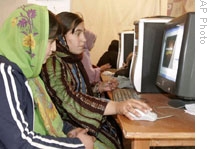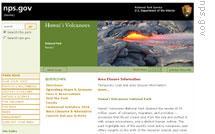-
(单词翻译:双击或拖选)
Computers around the world are connected in an extensive communication system called the Internet. Transcript1 of radio broadcast:
17 June 2008
VOICE ONE:
I'm Barbara Klein.
VOICE TWO:
And I'm Steve Ember with EXPLORATIONS in VOA Special English. Today we present the second part of our series about communications. We tell how computers are linking people around the world.
(MUSIC)
VOICE ONE:
 |
| Girls in Kandahar, Afghanistan, training to use computers and the Internet |
Last week, we told about the early history of the communication of information. We described how the telegraph was the first important device that could move information quickly from one place to another. And we discussed early radio and television broadcasts and the beginning of satellite communications.
In the early nineteen seventies, the American Department of Defense2 began developing a new project. It began linking major research universities across the United States.
VOICE TWO:
Professors at many American universities do research work for the United States government. The Department of Defense wanted to link the universities together to help the professors cooperate in their work. Department of Defense officials decided3 to try to link these universities by computer.
The officials believed the computer would make it easier for researchers to send large amounts of information from research center to research center. They believed they could link computers at these universities by telephone.They were right. It became very easy to send information from one university to another. University researchers working on the same project could share large amounts of information very quickly. They no longer had to wait several days for the mail to bring a copy of the research reports.
VOICE ONE:
This is how the system works. The computer is linked to a telephone by a device called a modem4. The modem changes computer information into electronic messages that are sounds. These messages pass through the telephone equipment to the modem at the other end of the telephone line. This receiving modem changes the sound messages back into information the computer can use.
The first modern electronic communication device, the telegraph, sent only one letter of the alphabet at a time. A computer can send thousands of words within seconds.
VOICE TWO:
The link between universities quickly grew to include most research centers and colleges in the United States. These links became a major network. Two or more computers that are linked together form a small network. They may be linked by a wire from one computer to another, or by telephone. A network can grow to almost any size.
For example, let us start with two computers in the same room at a university. A wire links them to each other. In another part of the university, two other computers also are linked using the same method. Then the four are connected with modems5 and a telephone line used only by computers. This represents a small local network of four computers.
Now, suppose this local network is linked by its modem through telephone lines to another university that has four computers. Then you have a network of eight computers. The other university can be anywhere, even thousands of kilometers away. These computers can now send any kind of information that can be received by a computer - messages, reports, drawings, pictures, sound recordings6. And, the information is exchanged immediately.
(MUSIC)
VOICE ONE:
Since it began, this system of computer networks has had several different names. It is now called the Internet. In nineteen eighty-one, this communication system linked two hundred thirteen computers. Only nine years later, it linked more than three hundred fifty thousand computers. Today, experts say more than one billion people around the world are linked by computers to the Internet. And, they say, this number will continue to grow.
Almost every major university in the world is part of the Internet. So are smaller colleges and many public and private schools. Magazines, newspapers, libraries, businesses, government agencies, and people in their homes also are part of the Internet.
VOICE TWO:
Computer experts began to greatly expand the Internet system in the last years of the nineteen eighties. This expansion was called the World Wide Web. It permits computer users to easily search for information using software called a browser7.
How fast is the World Wide Web part of the Internet system? Here is an example. A computer user in London, England is seeking information about volcanoes in the American state of Hawaii. She types in the words "Hawaii" and "volcano" in a search engine, such as Google.
 |
| Park Service site |
The computer produces a list within seconds. She chooses to examine information from the National Park Service's headquarters at the Hawaii Volcanoes National Park. The Park Service computer in Hawaii provides information about the huge volcanoes there, and how they were formed. It also has other useful information.
The researcher in London looks at the information on her computer. Then she prints a copy of it. Within seconds she has a copy of the National Park information including pictures. It has taken her less than five minutes to complete this research.
(MUSIC)
VOICE ONE:
Who pays for the Internet? That is not easy to explain. Each network, small or large, pays for itself. Networks decide how much their members will pay for their part of the cost of the local service connecting time. Then all of the large networks decide how much each will pay to be part of the larger network that covers a major area of the country. The area network in turn pays the national network for the service it needs.
Each person who has a computer at home pays a company that lets the computer connect to the Internet. These companies are called Internet service providers.
ISP's charge about twenty dollars a month for a slow dial-up connection to the Internet. A computer user with a high-speed wireless8 connection pays at least forty dollars a month. Wireless connections generally link computers to the Internet with a special technological9 device called a router.
VOICE TWO:
The United States used to have the largest number of Internet users in the world. However, in April, the USA Today newspaper reported that China now has the largest number of people using the Internet. Estimates from a Chinese research group said more than two hundred twenty million people in China were using the Internet as of February. That is about seventeen percent of the Chinese population.
The newspaper said the United States had two hundred sixteen million Internet users at the end of last year. That is seventy-one percent of the population. The Internet World Statistics10 Web site notes several other countries where more than sixty percent of the people use the Internet. They include Japan, Germany, the United Kingdom, Australia and South Korea.
Studies have shown that people use the Internet for communication and for research. Much of that research leads to buying products on the Internet. More people than ever are now using the computer for e-commerce – to buy and sell products electronically.
VOICE ONE:
Some governments, private groups and individuals have criticized the Internet. Some governments do not trust the Internet because they say it is difficult to control the information that is placed there. Some government officials say extremist groups place harmful information on the Internet. They say dangerous political information should be banned. Other groups say it is difficult to protect children from sexual11 information and pictures placed on the Internet. They say this kind of information should be banned.
Other critics say that it is becoming extremely difficult to know if you can trust the information that is found on the Internet. They wonder if the information is correct. Still other critics say the Internet is no longer a free exchange of information and ideas. They say it has become a big business that sells products, services and information. They want the Internet to be used only for research and education.
Next week we will examine some new technologies that have developed with the help of the Internet. Many of these technologies are being used in education.
(MUSIC)
VOICE TWO:
This program was written by Paul Thompson. It was produced by Mario Ritter. I'm Steve Ember.
VOICE ONE:
And I'm Barbara Klein. Our programs are online with pictures, transcripts12 and MP3s at voaspecialenglish.com. Join us again next week for EXPLORATIONS in VOA Special English.
 收听单词发音
收听单词发音
1
transcript

|
|
| n.抄本,誊本,副本,肄业证书 | |
参考例句: |
|
|
|
2
defense

|
|
| n.防御,保卫;[pl.]防务工事;辩护,答辩 | |
参考例句: |
|
|
|
3
decided

|
|
| adj.决定了的,坚决的;明显的,明确的 | |
参考例句: |
|
|
|
4
modem

|
|
| n.调制解调器 | |
参考例句: |
|
|
|
5
modems

|
|
| n.调制解调器( modem的名词复数 ) | |
参考例句: |
|
|
|
6
recordings

|
|
| n.记录( recording的名词复数 );录音;录像;唱片 | |
参考例句: |
|
|
|
7
browser

|
|
| n.浏览者 | |
参考例句: |
|
|
|
8
wireless

|
|
| adj.无线的;n.无线电 | |
参考例句: |
|
|
|
9
technological

|
|
| adj.技术的;工艺的 | |
参考例句: |
|
|
|
10
statistics

|
|
| n.统计,统计数字,统计学 | |
参考例句: |
|
|
|
11
sexual

|
|
| adj.性的,两性的,性别的 | |
参考例句: |
|
|
|
12
transcripts

|
|
| n.抄本( transcript的名词复数 );转写本;文字本;副本 | |
参考例句: |
|
|
|















